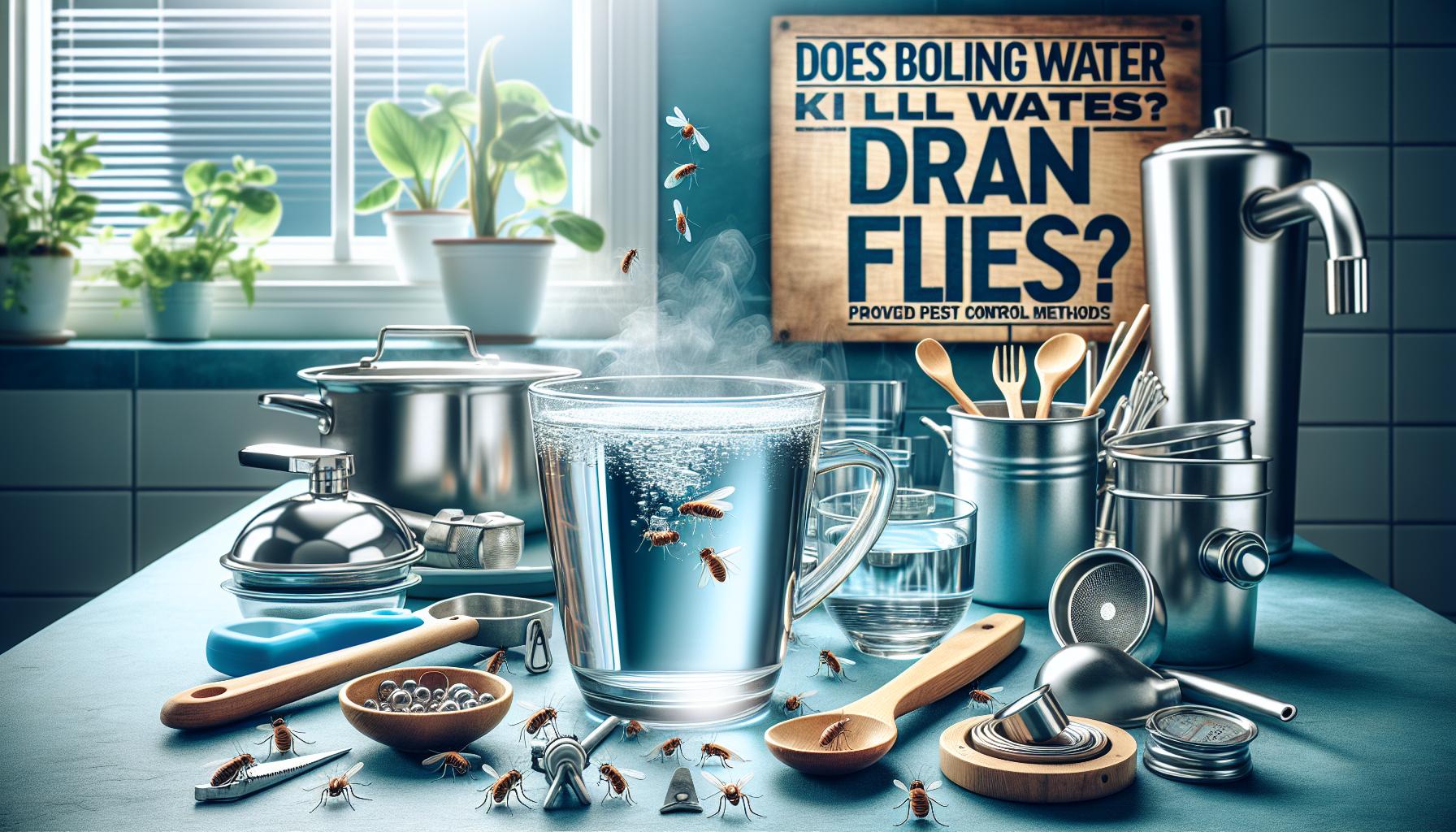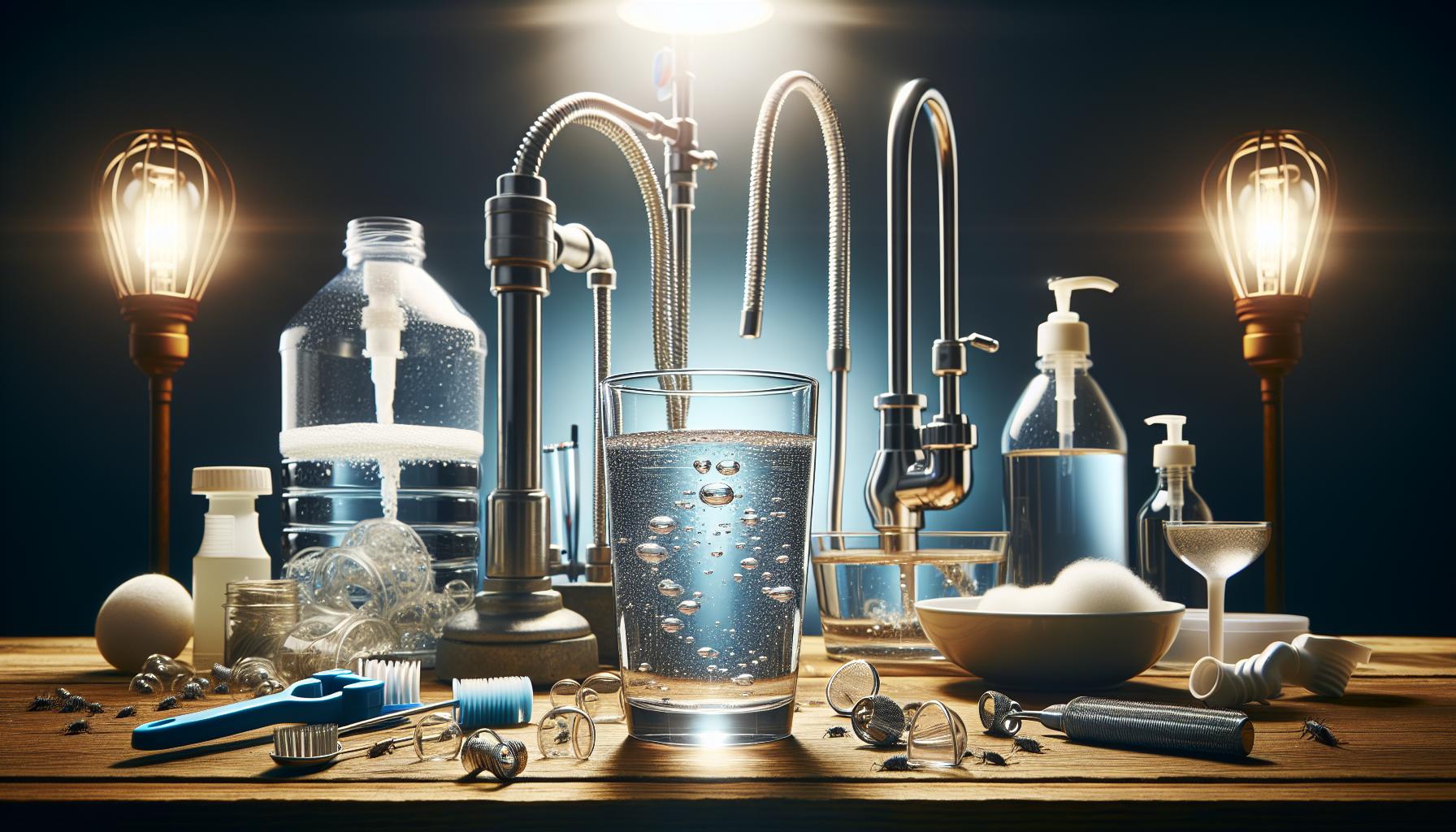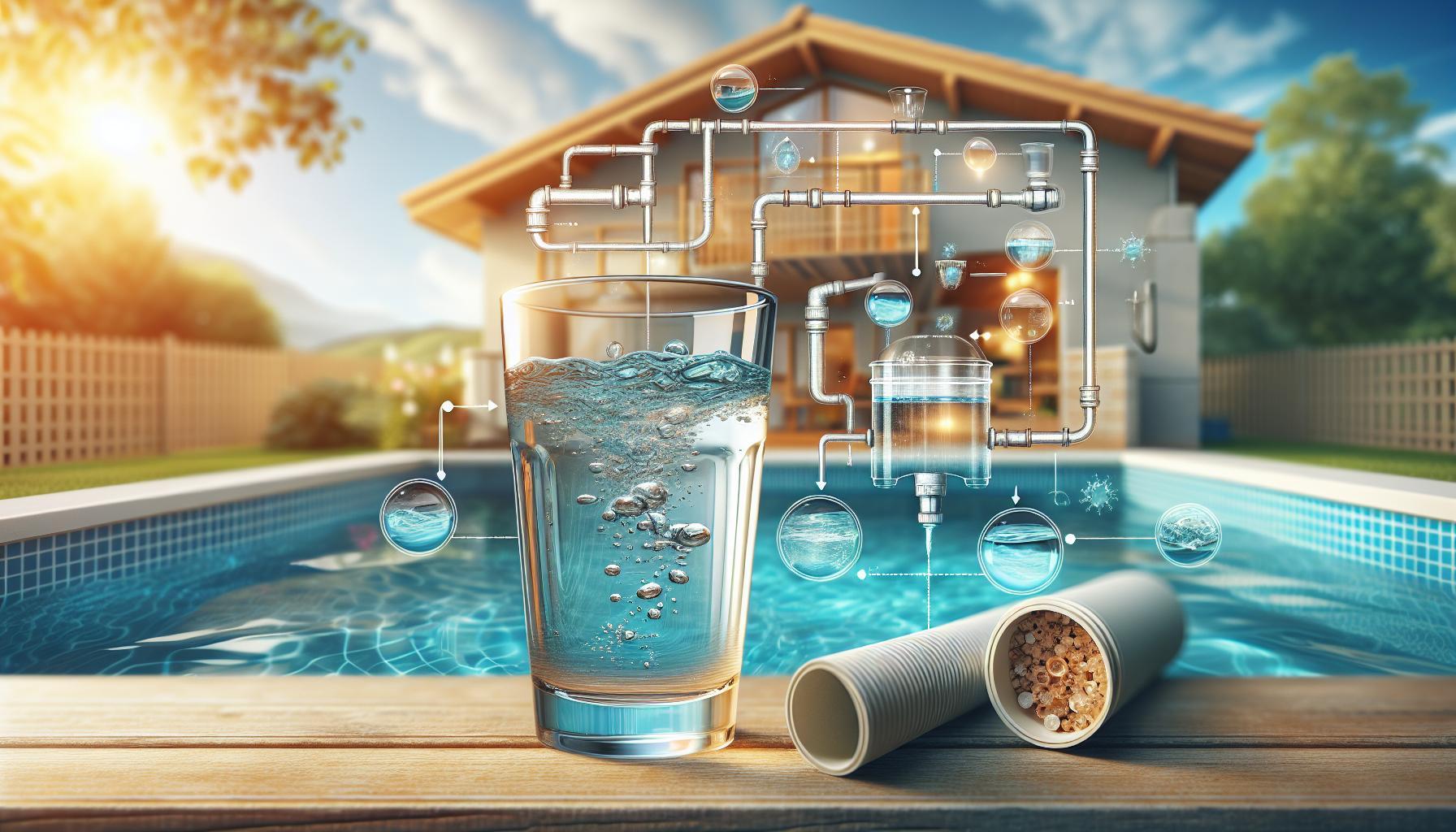Tired of pesky drain flies invading your space? You’re not alone. These tiny insects can quickly become a nuisance, but can simple boiling water really eliminate them? Discover effective pest control methods that combine practicality and proven results to reclaim your home from these unwelcome visitors. Stop the swarm and regain peace today!
Understanding Drain Flies: What You Need to Know
Drain flies, often mistaken for fruit flies due to their small size and winged appearance, thrive in damp environments, especially near drains and sewage systems. Their presence can be unsettling, and understanding their behavior and habitat is essential for effective control. Unlike other pests, drain flies primarily breed in organic matter found in stagnant water, making your plumbing system an ideal breeding ground. This characteristic leads many homeowners to seek answers to the question: does boiling water kill drain flies?
When considering methods for pest control, it’s important to recognize that while boiling water can certainly kill adult drain flies on contact, it may not be a comprehensive solution. Adult flies can be easily removed, but their eggs and larvae, often residing deeper within the drain, may remain unaffected. Therefore, utilizing boiling water as a pest control method should be part of a broader strategy. Here are some effective approaches:
- Regular Cleaning: Frequent cleaning of drains can significantly reduce the organic material that attracts drain flies. Use a mixture of hot water, soap, and vinegar to break down buildup.
- Drain Maintenance: Ensure that drains are free from obstructions and are functioning properly to prevent stagnant water accumulation.
- Professional Products: Consider using specialized drain cleaners that are designed to eliminate larvae and break down organic matter effectively.
- Preventive Measures: Installing drain covers and maintaining a dry environment will deter future infestations.
By combining methods like boiling water treatment along with consistent maintenance and preventive practices, homeowners can address drain fly problems more effectively. Awareness of their breeding habits is crucial—drain flies typically thrive in environments where food sources and moisture are plentiful. Therefore, tackling the source of the problem is essential for achieving lasting results against these persistent pests.
How Boiling Water Affects Drain Fly Habitats
Boiling water is often hailed as a straightforward solution for a range of pest control issues, particularly when it comes to managing pesky drain flies. These tiny insects thrive in damp, organic-rich environments, making drains their ideal habitat. The heat from boiling water demonstrates not only its effectiveness in sanitizing these areas but also its capability to kill off larvae and adult flies living in stagnant water, disrupting their life cycle.
When implementing boiling water as a method to control drain flies, it’s essential to consider the temperature and application technique. Boiling water must reach at least 212°F (100°C) to ensure it effectively eliminates both larvae and adult flies. This method is not just a quick fix; it can be particularly beneficial when combined with good drainage practices to prevent future infestations. Regularly flushing your drains with boiling water can significantly reduce the volume of organic matter that drain flies feed on, thereby making the environment less hospitable.
Additionally, while pouring boiling water down the drain is effective, it’s crucial to pair this tactic with other preventive measures. Here are a few actionable steps to enhance your pest control strategy:
- Regular Cleaning: Clean drains regularly to remove any buildup of grease or organic matter.
- Drain Maintenance: Use strainers and regularly inspect for clogs that could trap moisture and organic debris.
- Using Natural Repellents: Consider following up with baking soda and vinegar treatments to maintain sanitation.
Implementing these strategies may not only address the current drain fly problem but also help to prevent future occurrences. Understanding the role of boiling water in pest control emphasizes not just elimination but also the importance of maintaining a clean and dry environment to deter these insects effectively.
Proven Pest Control Techniques Beyond Boiling Water
The persistent presence of drain flies can wreak havoc in our living spaces, leading to discomfort and potential health concerns. While many might consider boiling water as a quick fix, it’s essential to explore a variety of proven pest control techniques to effectively tackle these pests. From natural remedies to professional options, understanding these methods can empower homeowners with the tools necessary to regain control over their environment.
Natural Remedies for Drain Fly Management
One of the most effective approaches to managing drain flies is to utilize natural remedies that not only eliminate these pests but also contribute to a healthier home environment. Here are several strategies to consider:
- Apple Cider Vinegar Trap: Combine equal parts of apple cider vinegar and water in a bowl. Cover it with plastic wrap and poke small holes. The sweet smell attracts flies while the holes trap them.
- Boric Acid and Sugar: Mix 1 part boric acid with 1 part sugar and 1 part water. This bait attracts extermination as they consume it, targeting the larvae without harming pets.
- Essential Oils: Oils like peppermint and tea tree are known for their insect-repelling properties. Mix a few drops with water in a spray bottle and apply it in affected areas to deter fly activity.
Improving Drain Maintenance
Prevention is crucial when it comes to drain flies. Regular maintenance of your plumbing systems not only helps in keeping your drains clear but also diminishes the likelihood of infestations:
- Regular Cleaning: Use a mixture of baking soda and vinegar to periodically clean your drains. This combination not only helps to eliminate organic matter that attracts flies but also aids in keeping your plumbing system in optimal condition.
- Drain Screens: Installing fine mesh screens over drains can physically block insects from entering while still allowing water to flow.
- Walk-Through Inspections: Regularly check and fix leaks, as stagnant water can be a breeding ground for drain flies.
When to Call in the Professionals
If natural remedies and preventative measures fail, it may be time to consult pest control experts. Professional exterminators have specialized tools and knowledge for effectively dealing with stubborn infestations. Here are a few points to contemplate when seeking professional help:
- Identify the Source: A pest control professional can perform an extensive inspection to locate the breeding sites that might be hidden from view.
- Integrated Pest Management (IPM): Many pest control companies use IPM principles, emphasizing environmentally friendly practices alongside effective pest control.
- Long-term Solutions: Experts can provide you with strategies to prevent future infestations rather than just offering a quick fix.
Taking a holistic approach to pest control not only enhances the efficacy of your efforts but also fosters a sustainable way to handle nuisances like drain flies. While the question “does boiling water kill drain flies?” might offer a quick answer, employing a range of proven pest control methods ensures a thorough and long-lasting solution.
The Role of Hygiene in Preventing Drain Fly Infestations
Preventing drain fly infestations hinges significantly on maintaining high hygiene standards in your home. These pesky insects, often found in damp and neglected areas, can rapidly multiply if left unchecked. Through a combination of cleanliness and proactive measures, you can drastically reduce the risk of attracting these unwanted guests. The most crucial first step is to eliminate the organic matter that serves as their breeding ground.
Understanding Drain Flies’ Breeding Habits
Drain flies thrive in environments where decaying organic material is present, making kitchens and bathrooms prime locations for infestation. They are particularly drawn to:
- Stagnant water
- Food residue in drains
- Clogged sinks and wet areas
- Dirty mop heads and cleaning cloths
For effective prevention, it’s essential to identify and address these locations in your home. Regular cleaning not only disrupts their life cycle but also limits their food sources.
Practical Hygiene Tips to Prevent Infestations
To bolster your home against drain fly infestations, consider implementing the following practices:
- Regular Cleaning: Ensure that kitchen and bathroom surfaces are cleaned frequently. Focus on areas around sinks and drains where food debris may accumulate.
- Drain Maintenance: Flush your drains with boiling water periodically. This method is simple yet effective. As discussed in Does Boiling Water Kill Drain Flies? Proven Pest Control Methods, it helps eliminate the organic matter that drain flies lay eggs in.
- Seal Entry Points: Inspect and seal cracks or gaps around pipes and fixtures where drain flies could enter.
- Enviro-Friendly Solutions: Use vinegar or baking soda to regularly clean drains, providing both a deep clean and an aromatic barrier.
Monitor and Respond
It’s vital to stay vigilant even after these preventive measures are in place. Monitoring for signs of drain flies, such as small clusters of flies around drains, helps catch infestations early. If you do notice a problem, prompt action using the methods outlined in articles like Does Boiling Water Kill Drain Flies? Proven Pest Control Methods can help restore hygiene.
In summary, the crux of preventing drain fly infestations lies in consistent and thorough hygiene practices. By keeping your environment clean, analyzing potential breeding grounds, and utilizing effective strategies, you ensure a drain fly-free home and allow for a more pleasant living space.
When to Seek Professional Help for Drain Fly Issues
When faced with a persistent nuisance like drain flies, it can be tempting to handle the problem with DIY methods such as pouring boiling water down your drains. However, while techniques like these can provide temporary relief, they may not address the root cause of the infestation. Before the situation escalates, understanding when it’s time to call in the professionals is crucial.
There are several indicators that suggest seeking expert assistance is the best course of action. If you’ve already tried methods like using boiling water or various home remedies, and the drain flies keep returning, it’s a clear sign that the issue may be more complex than anticipated. Professionals can conduct a thorough inspection to identify breeding sources that might be hidden from view.
Signs It’s Time to Call for Help
- Recurring Infestations: If drain flies continue to appear after multiple attempts at removal, this is a strong indicator that you’re dealing with a deep-seated problem.
- Unpleasant Odors: A foul smell emanating from your drains could indicate decomposing organic matter, which not only attracts drain flies but also needs to be professionally addressed.
- Extensive Damage: If you notice that your plumbing system appears to be under siege – with leaks or structural damage associated with moisture – a plumber or pest control expert should be contacted immediately.
- Health Risks: Drain flies can be a vector for various pathogens. If you’re concerned about health risks for your family or pets, reaching out to a pest control service is wise.
Additionally, drain flies can breed in less-than-obvious places. A professional pest control service specializes in determining conducive environments for infestations. They typically utilize proven pest control methods, that may go beyond the general scope of home remedies.
Professional Pest Control Solutions
| Method | Description |
|---|---|
| Insecticide Sprays | Professionally applied insecticides can quickly reduce adult populations. |
| Sanitation Measures | Experts can recommend systemic cleaning protocols to eliminate breeding sites. |
| Drain Treatments | Biological or chemical treatments that target fly larvae in drains. |
Taking swift action in seeking professional help for drain fly issues not only mitigates an existing infestation but also helps prevent future occurrences. By relying on proven pest control methods instead of temporary fixes like boiling water, you can ensure a more sustainable solution to your pest problem.
Additional Natural Remedies for Effective Drain Fly Control
When dealing with pesky drain flies, it’s crucial to explore all potential options to eliminate them effectively. Beyond the immediate solutions like boiling water, other natural remedies can significantly contribute to your pest control efforts. Many homeowners have successfully implemented these techniques, and you can, too!
Cider Vinegar Trap
One of the most natural and efficient methods to attract and trap drain flies involves the use of cider vinegar. The sweet scent of vinegar acts as a powerful lure, drawing the flies in. Here’s how to create an effective trap:
- Fill a small bowl or jar with cider vinegar.
- Add a few drops of dish soap to the vinegar. This helps break the surface tension, ensuring the flies will drown.
- Place the trap near areas where you’ve noticed drain flies, like sinks or drains.
- Replace the trap every few days for the best results.
Essential Oils for Repellant Effects
Aromatic essential oils are not only pleasant but also serve as an effective deterrent against drain flies. Certain oils like peppermint, tea tree, and eucalyptus have properties that can repel these unwanted guests. Consider the following methods:
- Diffusion: Use a diffuser to distribute essential oils throughout areas where drain flies are present.
- Spray Solution: Mix a few drops of essential oil with water in a spray bottle. Spray this solution around sinks, drain openings, and other potential entry points.
Salt and Baking Soda Mixture
Another popular natural remedy is the combination of salt and baking soda, which can help eliminate the organic matter that drain flies thrive on. This method is helpful as it cleans out the drain while also inhibiting fly growth.
| Ingredients | Amount |
|---|---|
| Baking Soda | 1/2 cup |
| Salt | 1/4 cup |
| Boiling Water | 2 cups |
Instructions:
- Mix the baking soda and salt together.
- Pour the mixture down the affected drain.
- Follow with boiling water to flush it out.
These additional measures not only help in controlling drain flies but also promote a cleaner environment, inhibiting their return. As you consider your options for pest control, remember that consistency is key; implementing these natural remedies alongside the boiling water method can create a multi-layered defense against these annoying pests.
Common Myths About Boiling Water and Pest Management
Many homeowners believe that boiling water is a miracle cure for all pesky pests. This myth is particularly prevalent when it comes to managing drain flies, as people often assume that pouring boiling water down the drain will eradicate not only the larvae but also the adult flies. While there is some truth to the idea that heat can kill pests, the reality is much more nuanced.
Understanding the Limitations of Boiling Water
While boiling water can indeed kill some insects on contact, its effectiveness against drain flies is limited. Here are a few points to consider:
- Accessibility of Larvae: The larvae of drain flies often hide within the slimy biofilm in the drain, making them difficult to reach with boiling water alone.
- Thermal Shock: Boiling water may not maintain its temperature long enough to penetrate deep into the breeding areas where larvae reside.
- Short-Term Solution: Even if boiling water does drown some drain flies, it does not address the root cause of the infestation, such as organic buildup in pipes that sustains the pest’s lifecycle.
Comparing Myths and Facts
To further debunk common misconceptions, here’s a comparison of popular beliefs regarding boiling water and its effectiveness in dealing with drain flies versus proven pest management techniques:
| Myth | Fact |
|---|---|
| Boiling water alone can eliminate all drain fly populations. | Boiling water may kill some adult flies but usually doesn’t eliminate the entire larvae population hidden in hard-to-reach areas. |
| Once you pour boiling water, the drainage problem is solved. | Drain flies can quickly reproduce, and without proper cleaning and maintenance, they are likely to return. |
| Boiling water is the safest insecticide available. | While it’s a natural method, pouring boiling water without care can cause burns or damage to plumbing depending on the material. |
By understanding these myths and facts about boiling water’s effectiveness against pests, homeowners can take a more informed approach. Rather than relying solely on boiling water to address drain flies, consider integrating methods such as cleaning traps, using specialized drain cleaning products, and ensuring proper sanitation in kitchens and bathrooms. These practices can provide long-term solutions and are more effective in managing drain fly infestations.
Faq
Does Boiling Water Kill Drain Flies?
Yes, boiling water can kill drain flies, as the high temperature eliminates the larvae and eggs commonly found in drains. However, this method is most effective when combined with other pest control techniques for long-term results.
Drain flies, also known as moth flies, breed in moist environments like sinks and drains. By pouring boiling water directly down the affected area, you can effectively disrupt their breeding cycle. Nonetheless, for a more thorough solution, consider effective pest control methods alongside this approach.
How Does Boiling Water Work Against Drain Flies?
Boiling water kills drain flies through thermal shock. The extreme heat effectively destroys both larvae and eggs, preventing them from maturing into adult flies.
When you pour boiling water into infested drains, it penetrates the organic matter where these flies thrive. This method is particularly useful for immediate relief, but to ensure all eggs are eliminated, it should be part of a broader *cleaning strategy* involving drain cleaning and regular maintenance.
What Are Proven Pest Control Methods for Drain Flies?
Proven pest control methods for drain flies include a combination of boiling water, vinegar, and effective drain cleaning solutions. This multi-faceted approach ensures both immediate and lasting results.
Using vinegar not only helps to kill the flies but also cleans the odorous buildup in drains. Consider this combination of methods to address infestations and prevent future ones by ensuring your sinks and drains are dry and clean.
Can I Use Other Natural Remedies Against Drain Flies?
Yes, natural remedies like vinegar and baking soda can also help control drain flies. These ingredients are safe to use and can be effective when applied regularly.
Combining equal parts vinegar and water with baking soda creates a *cleaning solution* that can break down organic debris in drains, thus eliminating fly habitats. For the best results, incorporate these methods into a regular cleaning routine to maintain pest-free conditions.
Why Do Drain Flies Keep Coming Back?
Drain flies often return due to unattended breeding sites. If the underlying factors that attract them, such as moisture and organic debris, are not addressed, these pests will persist despite treatment.
To effectively manage drain flies, it’s essential to locate and clean the breeding site, which can often be missed. Regular cleaning and using preventative products can reduce the chances of reinfestation, ensuring a fly-free environment.
How Often Should I Clean Drains to Prevent Drain Flies?
Cleaning drains at least once a week can significantly reduce the chances of drain fly infestations. Regular maintenance is key to keeping these pests away.
Adopting a routine cleaning schedule helps remove organic materials and moisture where drain flies thrive. Incorporating boiling water and natural solutions can enhance your efforts, leading to an effective overall pest management strategy.
Is Boiling Water Safe for All Pipe Types?
Boiling water is generally safe for metal and PVC pipes, but caution should be exercised with older or compromised plumbing. Always check the condition of your pipes before using this method.
If your plumbing is not in great condition or if you have any doubts, consider using other pest control methods that are gentle on your pipes while remaining effective against drain flies, such as vinegar or commercial drain cleaners.
In Summary
In summary, while boiling water can be a helpful method to combat drain flies, it’s important to combine this technique with other proven pest control strategies for the best results. Regularly cleaning your drains, maintaining proper hygiene, and using natural deterrents can significantly reduce the likelihood of these pesky insects returning. Remember, tackling drain flies doesn’t have to be overwhelming; with the right information and approach, you can confidently reclaim your space. We encourage you to explore further insights about household pest control and share your thoughts or experiences in the comments below. Together, we can keep our homes fly-free!






